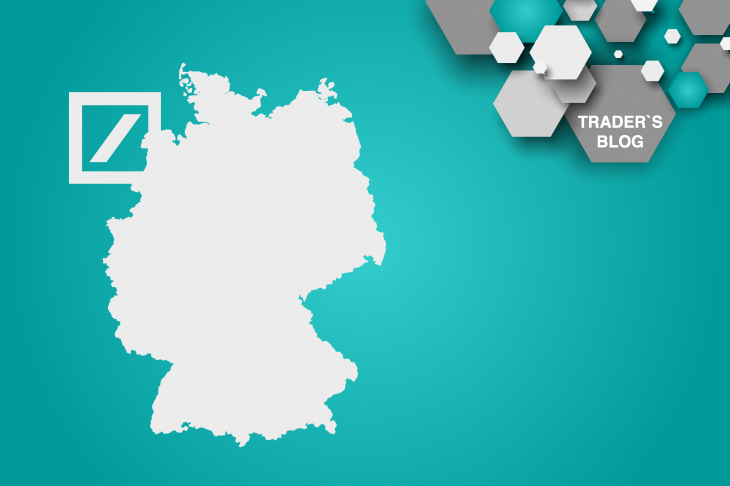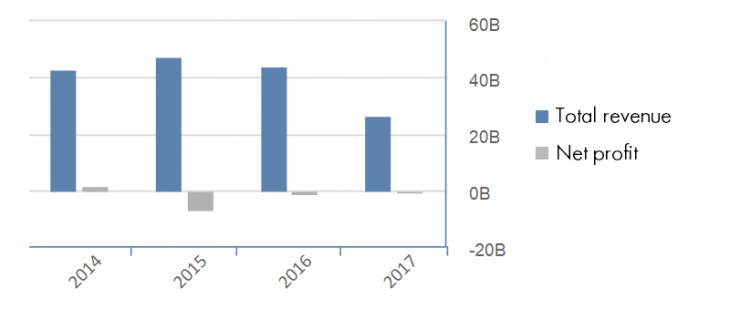
Deutsche Bank – alive or not? Anton Hanzenko.
Rumors about the imminent bankruptcy of Deutsche Bank, the oldest and largest bank in Europe and Germany, have long troubled the market. And for this there are all serious prerequisites, but is this possible in general?
The collapse of Deutsche Bank was expected in 2016, when Deutsche Bank AG shares fell to the level of 8.80 euros per share in September. At the same time bankruptcy of the bank did not take place, and Deutsche Bank shares formed some bottom.
With the bankruptcy of Deutsche Bank, often the effect of “dominoes” is linked, which will cause the collapse of the eurozone economy. And the bankruptcy of LehmanBrothers is given as an example, which served as one of the reasons for the beginning of the 2008 crisis. Part of the “domino” effect is possible and the bankruptcy of the bank with a volume of derivative positions on the sum of € 46 trillion, which exceeds the German GDP by 13 times, will be the strongest blow to the global economy. And this, as many say, can become not only the collapse of the eurozone economy, but the whole world.
But it’s worth remembering a few things:
- Comparison of Lehman Brothers and Deutsche Bank is not very correct. Since Lehman Brothers is a broker, and Deutsche Bank is a global bank that receives assistance from financial regulators. The work of regulators is mainly aimed at monitoring and, if necessary, support, which can significantly complicate the process of bankruptcy of this bank with the due desire.
- Despite the fact that Deutsche Bank continues to adhere to a very questionable policy, followed by significant fines, the state of Deutsche Bank is not so critical, despite the losses.
Thus, for the third consecutive year Deutsche Bank’s net profit remains negative, while in 2017 the bank announced bonuses to its employees at 2.2 billion euros ($ 2.7 billion).

Fig. Annual report on the profitability of Deutsche Bank.
In this case, the profitability report also indicates that the main decline fell for 2015-2016, but now there is a recovery.
- Since the beginning of 2008, Deutsche Bank has paid fines of more than $ 14 billion, but there are no applications for bankruptcy and assistance to the government of Germany, which does not act as a measure of sustainability, but speaks of a certain strength of the bank.
Recently, namely from 2017 and early 2018, Deutsche Bank continues to adhere to the reconstruction plan, as indicated by the change in the structure and appointment of the new Executive Director Christian Seving. At the same time, the bank continues to pay fines for legal litigation.
Theoretically, the bankruptcy of Deutsche Bank is quite possible, as well as other banks. But at the moment, given the economic recovery of the eurozone, this is unlikely. It is unlikely, if only because Deutsche Bank has receded from the lows. Regarding the same principle of dominoes and the new financial crisis, the bankruptcy of Deutsche Bank is unlikely to become the reason, as indicated by the weight reduction of the bank in recent years on the world financial scene.
Deutsche Bank’s shares in 2017 proved to be very resistant to negative sentiments and demonstrated high stability. The beginning of 2018 was marked by a downward trend, regression, which is also limited to significant levels of support. And while Deutsche Bank shares are far from historical lows.
In any case, the statements about the impending bankruptcy of Deutsche Bank are very exaggerated, not to mention that if it even happens, the bank will pull the euro area economy behind it. The world economy has the ability to learn from mistakes and therefore even the collapse of such a giant as Deutsche Bank will hardly have a lasting impact on the market.
Anton Hanzenko